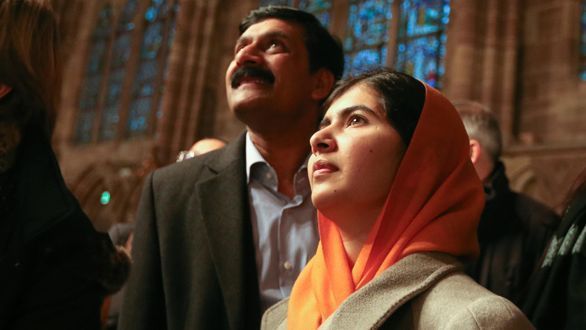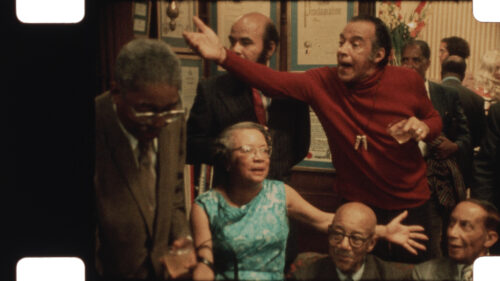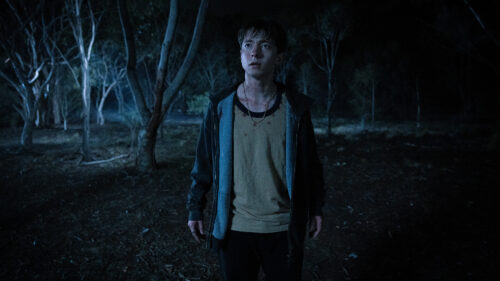The sound of the Toronto International Film Festival starting is also the knell of Telluride’s end for the year. Having seen more than ten films in three days across seven theaters, I’d say the festival did me well, especially with the high average of worthwhile upcoming releases I was able to get an early peek at. The following is my last correspondence from Telluride, touching upon four movies I screened, one during a special “After the Festival Festival.”
With “He Named Me Malala,” documentarian Davis Guggenheim (“Waiting for ‘Superman,'” “An Inconvenient Truth“) certainly has an extraordinary, internationally significant subject. Malala Yousafzai was a young woman living in Pakistan, speaking out for gender equality within education, when the Taliban targeted her, and shot her in the face. With the world previously captivated by her diary entries posted by the BBC, she underwent physical therapy, forgave the people who had tried to killed her and her friends, and wrote a book about the events. For her work that followed as an advocate for education across the world, she became the youngest person to be awarded the Nobel Peace Prize.
Malala may indeed one of the best humans on this earth right now, but Guggenheim isn’t satisfied with just that. He has to turn her into a walking myth, one who symbolizes hope for young and old, with a fascination of youth no different than starlets in celebrity culture. When he films Malala on a red carpet during some speaking event, his camera has the exact same intention as the others flashing bulbs.
Somewhere underneath Guggenheim’s sanctimonious filmmaking is Malala’s true character, which struggles to come out through strained interviews, or unnatural voiceovers in which she shares her life experience. His efforts are less to share her story but sell them, with cliched reenactments and whimsical animation. All of this is doused in a definitively maudlin score from Thomas Newman.
In creating the big picture of Malala’s past and present, Guggenheim unproductively juggles details. The back and forth between her current status as a human rights celebrity and her past story is awkward, especially to how Guggenheim makes the audience wait for a first-person recount of her life-changing attack.
Aside from how forced the documentary feels on its own, there is a big difference felt when Malala is out of Guggenheim’s grasp. Appearing via satellite to a Telluride Q&A moderated in person by Ken Burns with Guggenheim and Malala’s father Ziauddin, she had the character of a bashful, but proud, normal girl. Answering a question given to Burns by his daughter Olivia about what happened to her attackers, Malala instead focused on the importance of forgiveness. It was a touching sentiment, with no projection of wonder needed. But the best moment came when she confided to hundreds of people in the audience about her anxieties with her exams, saying that the best day in her life was when she got her grades back (a moment bigger to her than the Nobel Prize). She’s an eloquent speaker for international education rights, but the natural irony is that, like nearly other teenager, she is not a perfect student.
Even the documentary’s title adds an unnecessary layer to her life. Her co-written book was titled “I Am Malala,” but Guggenhein pointlessly focuses on how the name’s mythic quality (concerning a woman who rallied men to fight like lions, not die like slaves) must mean something, and that it came from a father nonetheless. Instead, Guggenheim’s title is just him speaking for Malala yet again in this tale more about our desperation for real life heroes than a natural embrace of one.

Todd Haynes’ “Carol” is a film of gazes, and the significance of watching and understanding another person in that brief intimate moment shared between two people whose eyes connect. It happens all of the time in close public spaces, or scoping around the place for faces we find enjoyable to look at. Along with the ping of discomfort, there’s a rush to it as well. What if we just keep looking, and the other person looks back?
“Carol” pursues that curiosity into an attraction between two women—a department store clerk named Therese (Rooney Mara) and a rich socialite, wife, and mother named Carol (Cate Blanchett). The two make eye contact while Therese is working in the department store. Carol is simply consulting Therese about delivering a Christmas gift, but there’s already a power she has over the clerk. Carol is confident, almost grinning, while Therese’s open eyes are in a type of awe.
When Therese leaves behind her gloves accidentally during this meeting, the two contact, and begin a friendship. Carol’s husband, Harge (Kyle Chandler), gets suspicious, especially considering his own insecurities about a relationship Carol had with “Aunt Abby” (Sarah Paulson). Harge, unable to let someone else get the attention of his wife, threatens to take away their child if Carol doesn’t stop seeing her. Meanwhile, Therese tries to understand her fascination with another woman, whose intrigue is larger than just a gender designation.
“Carol” succeeds through its reliance on Mara and Blanchett’s chemistry, which is apparent right off the bat. They build a slow tension , and Haynes’ movie takes off as a tale about two separate people before it becomes a great romance. Separately, they vividly confront the phenomenon of this new attraction, without melodrama. The grace of “Carol” is that it can recall Haynes’ previous “Far from Heaven” in its ideas, but not in the melodrama intended there, but not intended now. Phyllis Nagy’s “Carol” script has beauty of its own (based on the Patricia Highsmith novel, “The Price of Salt”), but its performances, and the force within these particular faces, complete it.
The film is boosted by sumptuous period detail in its clothes, cars, and restaurants. The cherry on top for this aesthetic package is Carter Burwell’s absolutely fantastic score, which will end as one of the year’s best. In a film about tension between two people, it beautifully inhales and exhales, with two key parts laid on top of each other, as if in different tempos.
“Carol” debuted at the Cannes Film Festival, where it scored a Queer Palm and a Best Actress award for Rooney Mara, and, with its careful release to festivals this season, is sure to ride the wave of hype to a December release. It is an immediately lovely, passionate movie that lives up to its clamor, but a second dive (during the Chicago International Film Festival) into its rich experience will determine just how much it resonates.

A particularly special film of a different lasting impression is the highly-anticipated new venture from screenwriter Charlie Kaufman, “Anomalisa.” His first directed venture since the shattering “Synecdoche, New York,” Kaufman co-helms with Duke Johnson to create a fantastic stop-motion piece, one that is built purely from a Kaufman script, who finds a new artistry within animation.
“Anomalisa” is a triumph for Kaufman’s brand of melancholy, which is at once intimate and synonymous, about little people in big worlds. By applying Kaufman’s inclinations to an animated world, his focus on the mundane details shines, and he creates animation history in the process. This is a meticulously-made movie about a man (voiced by David Thewlis) trying to connect with a woman (Jennifer Jason Leigh, with a lot of soul), that plays out in a hotel room, offering an anti-showy nature to the form. It is an incredibly visual endeavor, in the ways least expected.
It goes without saying that the film is thoroughly original, and heartbreakingly intimate in certain passages. Working without actors, the movie has its own tenderness, but when it ramps up to some very intense moments, its stop-motion characters don’t seem like substitutes but brilliant artistic choices. Even when the film does a close-up of their faces, it has a wondrous quality to it. Fitting, then, that “Anomalisa” offers certain stimulations of the mind and heart not experienced since the last time Kaufman got behind the camera.

A little secret about Telluride is that some of the movies don’t leave when the filmmakers do, or when the official schedule ends. The town has an epilogue of a mini-festival, happening at two different theaters (the appropriately named Nugget and the much larger Palm) each showing two different movies each night. Dressed incognito in the town (AKA not wearing my festival badge, but still carrying a Sundance tote bag) I checked out their screening of Michael Ware & Bill Guttentag’s “Only the Dead See the End of War,” a documentary listed as the Nugget’s first showing of the night.
Ware is known in Iraq’s modern war history as one of the few reporters who was in the country for one of the longest periods of time, before and during its invasion. As an Australian reporter, he gained very close access to the insurgents who sought to kill Americans. The access that they gave him a decade ago is still unbelievable—they invited him to their meetings at night, where they planned their attacks, and sent him videos of their plans at work, documenting the people and their bombings. Most horrifically, they used him to share videos of executions. Embedded in this darkness, Ware grew a particular fascination with a top leader of the insurgence Abu Masab al-Zarqawi, creating a morbid
The second half of this documentary focuses on the American soldiers, who provided him with the same type of access to their efforts in fighting the insurgency. He is with them when they are patrolling at night, hunting for insurgents in a completely dark house. Later, his camera takes us to a sniper post, in which we meet the young American men who are set up for days, waiting for something to happen.
There is nothing but horror within this movie, which Ware gives to us like Martin Sheen’s Captain Willard after venturing into an abyss of violence in “Apocalypse Now.” Ware narrates the story with complete defeat in his voice; a tone that would be annoying in nearly any other film, but fits to the graveness of the events, especially as he explains how he progressively lost his mind. The documentary is about war, but more provocatively a man’s personal free-fall into it, in which he subjects us to all that he has seen.
In “Only the Dead See the End of War,” the most unflinching war documentary I’ve ever seen, Ware is first-hand embedded in a kill-or-be-killed scenario, where the natural environment is phenomenally tense and terrifying, even as just a viewer in a theater. But to turn away from these things is a type of privilege. This is a movie that takes you directly into hell, without the explanation of a production. One can choose to look away from scenes of this movie, as I admit I did in a couple instances, valuing the extreme luck I have to rarely ever see a human life ending in front of my eyes, whether in person or on camera. For those ready or willing to experience the content, the documentary is a searing, utterly vicious look at a purely man-made chaos, from both sides of the conflict. It is a piece of non-fiction filmmaking that does not provide the viewer any space between life and death.
After that final screening, Telluride was ready to let me go. For the first time since an ill-fated attempt to get into “Suffragette” at 8:30 AM on Saturday morning, I couldn’t get into a second screening that night of the acclaimed documentary “Sherpa,” a favorite of people I had shared a gondola ride with. The town had resumed its normal order—the famous “SHOW” banner for the film festival had now been replaced with their next order of business, “Bear Awareness Week.” Instead of talking about the film talent, now the local residents (who volunteered for the fest, such as my new friend Rio) were musing about “Blues and Brews,” the next force of entertainment to bring outsiders and fervent fans to their lovely landscape.
But, Telluride left me with this very sunset, a fine cone of chocolate fudge brownie ice cream as I strolled back to my hotel, and these reports of which it has been a great honor to post on RogerEbert.com (Roger’s words for this festival are mountains I stand humbled by). Most of all, Telluride gave my soul some new great movies, and memories that any cinephile, whether a filmmaker or fest-goer, would be lucky to treasure.













